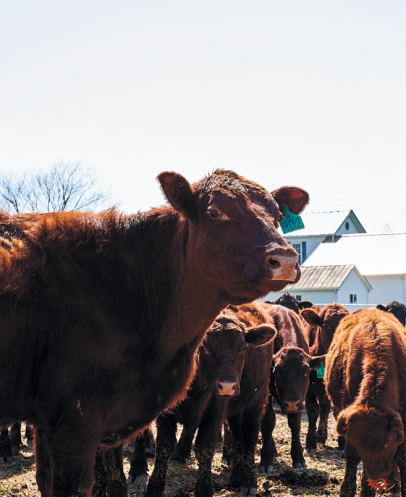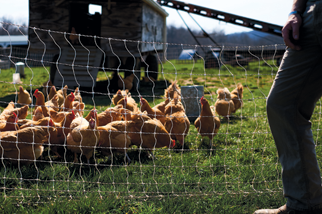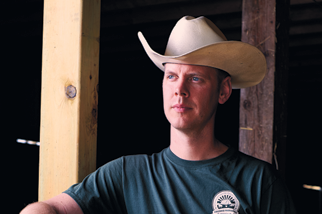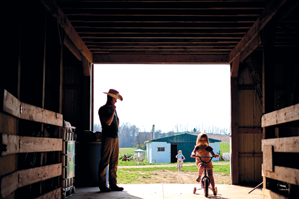Another Kind of Service
Acclaimed chef Lidia Bastianich, speaking about servicemen and -women who have transitioned into agriculture, describes farming as a different kind of service to the country. As American farmers grow older and retire, it takes a certain type of person to work the land. The long hours, unpredictability and physical demands of farming aren’t a fit for everyone. In increasing numbers, however, our nation’s veterans are answering the call.
Thanks to advocacy by the Farmer Veteran Coalition (FVC), the 2014 Farm Bill designated veterans as a new class of beginning farmer and opened the office of Military Veterans Agricultural Liaison to assist this new group who could help fill the gap left by retiring farmers. Founded in 2008, the Farmer Veteran Coalition today has more than 10,000 members, a large number of them with post-9/11 service. Recognizing that many of those who serve our country come from rural areas, the FVC works to assist these men and women so that they can transition into a career that helps them feel at home when they return.
Part of the Solution
Paul Dorrance, owner of Pastured Providence Farmstead, is a member of the Farmer Veteran Coalition and is the recipient of a 2018 grant through the FVC’s Farmer Veteran Fellowship Fund. An Air Force reservist and former active-duty pilot, Paul says that planning for his first child started him and his wife, Heather, down a path that led them from an Air Force base in Columbus, Mississippi, to 111 acres of farmland and forest tucked away from the outside world down a long dirt driveway in Chillicothe, Ohio. Navigating how to best care for Heather and the baby during her pregnancy, the couple started looking seriously at what they were consuming and made the decision to start purchasing organic, non-GMO and local food. They researched everything, weighed pros and cons, and tried to make the best decisions they could based on what they knew and what they valued.
And when Paul was faced with the decision of signing on for eight more years of service and a military pension, or going in a different direction, they did the same. He says choosing the farm wasn’t the better financial decision, but it wasn’t a hard decision to make either. “We jumped into this place, against pretty much every piece of good advice I’ve ever been given,” Paul says without a hint of regret.
Paul chose Ohio because his two siblings had moved to the state and this allowed him and Heather and their children to be close to family. Five years after his move, Pastured Providence Farmstead raises cows, pigs, sheep, turkeys and chickens using rotational grazing along narrow stretches of green pasture that line the ridgetop behind the farm house. The cows are 100% grass-fed and grass-finished, a step that Paul explains is necessary to produce a quality steak. The feed that he does use with other animals is non-GMO, supplied by another local farmer. No longer just a consumer, the farm has given Paul a chance to put his beliefs into practice. “I began to think about essentially putting your money where your mouth is, literally. We eat this way now and we believe in this kind of agriculture. Why wouldn’t we be part of the solution for other folks, and provide others with the meat that we have been seeking for ourselves?”
Farm School
Paul takes a new brood of 25 chicks, just a few days old, to their new home in the barn. He shows off their milking cow and her calf, and two orphaned lambs he’s hoping will take to a ewe who lost her twins. The orphans so far are bottle-fed, an investment in time that could be spent on another 50 different chores and has to be weighed that way. It was Heather’s idea, he says, and it seems to be the right choice.
The chickens Paul raises are Freedom Rangers, a hybrid breed commonly raised as meat birds. Paul says ideally, he would keep the entire cycle on the farm, incubating his own eggs each year. But the hybrid variety provides more of the white meat that customers want and expect. Consumer preferences, unfortunately, have been shaped by the same agricultural practices that Paul is intentionally avoiding—reliance on GMO feed and antibiotics, for example—and Paul tries to find that balance between the farm’s ideals and what customers will pay for. It’s a decision Paul is still weighing, and he says he’s watching the birds this year to help him decide.
For others planning to transition into agriculture, the work Paul and Heather have put into their farm for the last five years offers an invaluable learning tool. Hosting a “Farm School” event was always a part of the plan for Pastured Providence (it was attending a similar program that solidified the couple’s own path in farming) but this was the first year Paul felt they were ready.
“I don’t have everything figured out, but I’ve learned a thing or two over the last five years. And I felt, really, like last year and beginning now this year, I’m ready to start investing in other folks and sharing what we’ve learned.”
Sense of Place
Four of the 16 participants at the Farm School were veterans. Two of the four had also moved with their families to Ohio to start farming. Dan Davis and Tony Clark jointly run Ohana Farms (ohana is a Hawaiian word for family) near Circleville, Ohio.
Dan is a member of the Ohio Air National Guard. Like Paul, he was an active-duty pilot with the Air Force. Tony is retired from the Navy, and spends his time taking care of more of the day-to-day farm operations. Both Dan and Tony relocated several times during their military careers, and for Dan and his wife, Tracey, part of the appeal of farming was having a stable home for their children.
“I wanted my kids to have a sense of place,” Dan says, “a little place in the world they could call their own.”
What Tony appreciates about farming is that, like his work as an electronics technician and then chief engineer with the Navy, every day on the farm is something different—plowing fields, repairing machines, building barns, rounding up turkeys, managing beehives.
He also values being able to raise food for his family. “I grew up knowing where food came from,” Tony says, adding that he’s learned in time that it’s no longer common knowledge.
When Dan, Tony and their wives discussed their plans for settling down, they decided to pool their resources and purchased neighboring 15-acre plots. This year the two families are raising a cow and calf, hogs, bees, chickens and turkeys. They planted alfalfa, winter wheat and are trying their hand at growing different kinds of produce. Dan tells me that Ohana is still a hobby farm at this point, but they are hoping to learn as much as they can from Paul and Heather’s experience.
Good Kids
Sitting with Paul at his dining room table, we talk about the farm while his two girls build with Legos in the next room. His son, Caleb, is at karate. Paul tells a story of the girls tromping off through the fields with the dog a few weeks back. They were far enough away to be on their own, but not out of sight, and Paul describes the feeling of gratitude he experienced watching them. On the farm they learn responsibility, but they have space to roam and time to be kids, and that’s a big reason why this farm is the right decision for the family.
“You can raise good kids anywhere. You can raise good kids in the military. But for some reason, it seems a lot easier to raise good kids out in the country. I don’t know why that is, but I love it. I love it for them.”
Pastured Providence Farmstead | Chillicothe, Ohio | www.pasturedprovidence.com
Find Pastured Providence at the Worthington Farmers Market this summer.
Ohana Farms | Circleville, Ohio | facebook.com/ohanafarmsohio
Farmer Veteran Coalition | www.farmvetco.org







